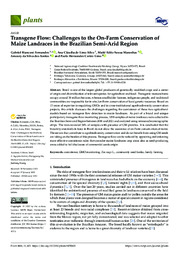Transgene flow: challenges to the on-farm conservation of maize landraces in the Brazilian Semi-Arid Region.
Transgene flow: challenges to the on-farm conservation of maize landraces in the Brazilian Semi-Arid Region.
Author(s): FERNANDES, G. B.; SILVA, A. C. de L.; MARONHAS, M. E. S.; SANTOS, A. da S. dos; LIMA, P. H. C.
Summary: Brazil is one of the largest global producers of genetically modified crops and a center of origin and diversification of relevant species for agriculture and food. Transgenic monocultures occupy around 50 million hectares, whereas smallholder farmers, indigenous people, and traditional communities are responsible for in-situ/on-Farm conservation of local genetic resources. Based on 15 years of expertise in regulating GMOs and in cross-institutional agrobiodiversity conservation projects, this article discusses the challenges regarding the coexistence of these two agricultural models based on transgene flow detection in maize landraces. As part of a broad and unique participatory transgene-flow-monitoring process, 1098 samples of maize landraces were collected in the Brazilian Semi-arid Region between 2018 and 2021 and analyzed using immunochromatographic strips. The tests revealed 34% of samples with presence of GM proteins. It is concluded that the biosafety standards in force in Brazil do not allow the assurance of on-Farm conservation of maize. The sectors that contribute to agrobiodiversity conservation and do not benefit from using GM seeds are taking on the burden of this process. Transgene flow can be reduced by approving and enforcing more effective coexistence rules that consider maize landraces crop areas also as seed-producing areas added to full disclosure of commercial seeds origin.
Publication year: 2022
Types of publication: Journal article
Observation
Some of Embrapa's publications are published as ePub files. To read them, use or download one of the following free software options to your computer or mobile device. Android: Google Play Books; IOS: iBooks; Windows and Linux: Calibre.
Access other publications
Access the Agricultural Research Database (BDPA) to consult Embrapa's full library collection and records.
Visit Embrapa Bookstore to purchase books and other publications sold by Embrapa.

